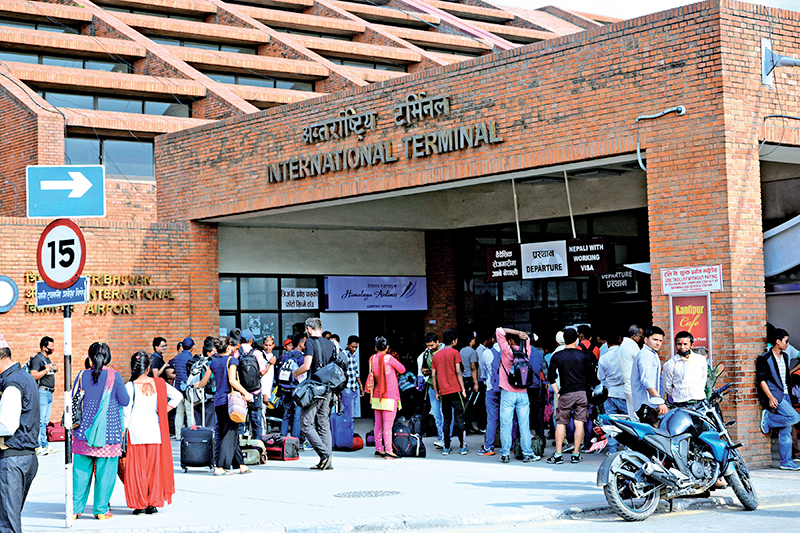Duped Nepali women return from China
Kathmandu, July 28
Forty-four Nepali women, who were duped and sent to China for foreign employment, returned to Kathmandu today.
They landed at Tribhuvan International Airport on three different flights of China Eastern and China Southern Airlines, the last of the three flights landing at 4:25 pm.
Compass Recruitment, a foreign employment agency based at Pingalasthan, Gaushala, had sent the women to Dandong Rishang garment factory in Dandong, a city in southeastern Liaoning province bordering North Korea, in May.
The agent had promised them a salary of $400 per month. The demand letter attested by the Nepali Embassy in Beijing also mentioned $400 per month salary. However, they were paid only $50 for the first month. After the women protested, they were given an additional $100.
“We realised we were duped only after we received the first month’s pay,” Sunita Limbu of Taplejung told The Himalayan Times upon arrival at Tribhuvan International Airport. Limbu said the agency asked them to sign various papers, some of which mentioned $250 monthly salary and others mentioned $400.
Another woman from Pokhara who did not want to be named told THT at the airport that the agent had promised $250 a month for the first three months and $400 a month afterwards. “We were told that they would impart training for the first three months when our salary would be $250 a month,” she said.
Another woman from Ramechhap, who was received at the airport by her husband and five-year-old son, however, said that she was promised $500 a month.
After the women refused to accept the first-month salary of $50 and stopped going to work, the Chinese employer then handed them an additional $100. “Our bosses came to us at 12:00 midnight and handed us an additional $100. They assured that our salaries would be raised gradually,” said the woman from Pokhara. “Giving them the benefit of doubt, 20 of us decided to rejoin work, but 24 of us did not.”
Limbu of Taplejung said the Chinese employer also summoned the Nepali recruitment agency after our complaint. “But they vanished soon afterwards,” said Limbu, who had previously worked in Lebanon and Malaysia.
The woman from Pokhara said the Chinese employers were also shocked to learn that the Nepali agency collected Rs 70,000 each from them. Actually, the Chinese company had paid ticket and visa fees and training costs to the agency.
“We later learned that the company had sought only skilled manpower for sewing job, and had paid a certain amount to the Nepali agency to train prospective candidates before sending them,” said the woman from Ramechhap.
“However, the agency lied that they were being sent for packaging job. They also handed us sewing-training certificates. We did not know what to do with the certificate initially, but later we came to know this was how we were duped.” Limbu said since they had not done sewing previously, it was difficult for them to do the job. “We somehow worked for 11 hours a day, from 7:00 am to 6:30 pm with 30 minutes break from 12:00 pm to 12:30 pm,” she said.
The women also said they had not complaints against the employer, except for the salary discrepancy and bad food. They said they were also yet to be paid the last month’s salary.
They demanded that the agent should reimburse their investment and provide compensation. “We urge the government and the media to help us recover our investment and compensation from the agent,” they said.
The women also said they later came to know that they were sent on visit visa and not employment visa.
However, officials at the Nepali Embassy in Beijing said the women might have misunderstood because they were hired by the Chinese company following all due formal processes, and the women travelled to China on a one-month ‘Z’ employment visa, which was later extended.






